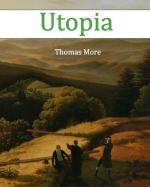|
This section contains 5,917 words (approx. 20 pages at 300 words per page) |

|
SOURCE: "Rhetorical Strategy and the Fiction of Audience in More's Utopia," in The Centennial Review, Vol. XXIX, No. 3, Summer, 1985, pp. 302-19.
In the essay that follows, Astell focuses on the letters, or parerga, that introduce More's text, using them to study how the fiction constructs its audience and, specifically, how the dialogues achieve their purpose through "indirection. "
St. Thomas More's Utopia, whether considered as dialogue or discourse, is a self-consciously rhetorical work, and critics tend to approach it accordingly. Scholars primarily interested in logos as a means of persuasion typically characterize Utopia either as an argument upholding the superiority of the "philosophical city" so vividly described in Book II, or as a carefully balanced (and unresolved) debate about "The Best State of a Commonwealth." Critics especially sensitive to the pathetic appeal describe More's book as a satire against England. Still others, concerned with the personal appeal, have argued...
|
This section contains 5,917 words (approx. 20 pages at 300 words per page) |

|


